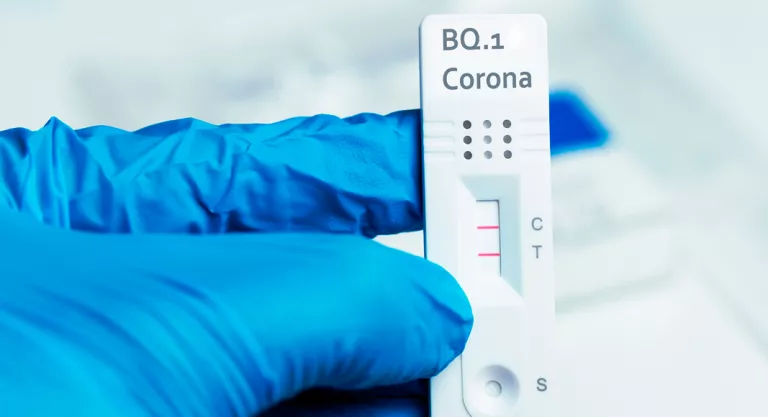Last week, a new omicron subvariant, BQ.1, was detected in the wastewater of Catalonia, which comes from BA.5 and is now the most likely candidate to become the dominant SARS-CoV-2 variant this fall. -winter in Spain, since, although “at the moment, it has not been found in any person”, as declared by the Secretary of Public Health of the Generalitat, Carmen Cabezas, in RAC1, the laboratory analyzes that have been carried out reveal that BQ.1 presents “more transmissibility, but less severity”.
The non-compulsory use of masks indoors – except in certain spaces, such as socio-health centers (hospitals, pharmacies, nursing homes…) or public transport, and the fact that in the coldest months social gatherings are held indoors, that home isolation is not mandatory in mild cases of COVID-19 and that anti-COVID measures have been eliminated in schools, may contribute to the spread of BQ.1 and its version BQ.1.1.

In fact, data from the Ministry of Health shows that there is an upward trend in the number of COVID-19 cases registered in our country because as of October 14, a total of 20,652 cases had been reported, double the number previous week, an increase of 30 points in the incidence, which reaches almost 200 cases per 100,000 inhabitants, and which could be related to the arrival in Spain of the BQ.1 variant.
Symptoms of the omicron subvariant BQ.1
Of course, if we test positive, it is not easy to identify which variant affects us, however, there may be some nuances that help us know. Thus, the symptoms of the BQ.1 variant of the SARS-CoV-2 coronavirus are similar to those of previous variants, and can also be confused with those of other infections of the respiratory system, but those that have been found most frequently so far and The ones to watch out for first are:
What risks does BQ.1 represent compared to other variants?
But the concern of the experts is based on the great capacity that BQ.1 has to evade the body’s immune response, and escape both the protection conferred by the vaccines against COVID, and that triggered by the antibodies generated after an infection. previously, what is known as immune escape, and which had already been observed with other subvariants of omicron, such as BA.2.
“BA.2.75.2 (another recent omicron version) and BQ.1.1 are the most elusive variants of antibodies that have been found, far outperforming BA.5”
The virologist Tom Peacock from the Department of Infectious Diseases at Imperial College of London has explained on his Twitter account that “BQ.1.1 (a descendant of BA.5) has shown very rapid growth in recent weeks, particularly in the United Kingdom”, although he warns that no data is yet available “on antigenicity, etc.” A report by the United Kingdom Public Health Agency (UKHSA) indicates that the growth capacity of the BQ.1 and BQ.1.1 variants is 29% higher than BA.5, which is the one that currently predominates, and their presence it has already been detected in other countries in Europe and the United States, especially in New York, according to Dr. Eric Topol, professor of molecular medicine at Scripps Research (USA) and director of the Scripps Translational Research Institute.

BA.5 was already considered highly contagious, and “BA.2.75.2 (another version of omicron recently appeared) and BQ.1.1 are the most elusive variants of antibodies that have been found, far outnumbering BA.5,” he said. said the Chinese immunologist Yunlong Richard Cao who carried out a study together with his team in which they analyzed 40 samples from people who had received three doses of CoronaVac (from the pharmaceutical company Sinovac) and 100 from people who had been vaccinated and who had subsequently been infected with the virus. BA.1, BA.2 or BA.5. “In all cases, the ability of the antibodies to escape was similar”, the scientist assured. The results of this work were published in September on the bioRxiv preprint server, as they have not yet been peer-reviewed for publication in a scientific journal.
Will vaccines or natural immunity protect us against BQ.1?
“The immunity that we have generated against other variants no longer works. It is true that protection by vaccines or by possible infections still exists in our body because we have generated antibodies, but if there is an unrecognized mutation of a certain variant, as is the current case, the possibility of contagion increases” explained Nacho de Blas , an epidemiologist at the University of Zaragoza in statements to the newspaper Heraldo, who adds that “BQ.1 can infect people who are supposedly already immunized. As for its severity, it is still early to evaluate it, since it is no longer like it was at the beginning because the virus is facing those who have already survived other infections.
Regarding the new vaccines adapted to the BA.4 and BA.5 variants of omicron, the doctor and researcher Eric Topol believes that we will not know to what extent the new variants will elude the current vaccines until their presence does not reach 30 or 50 % of cases in some region, as declared to the Fortune portal. However, this expert has ventured to predict that “it will not end the effectiveness of the vaccine, but it could make a dent in the protection against hospitalizations and deaths.”
.















